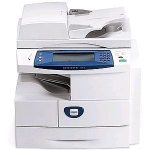
Since the late 1950s and early 1960s when Xerox introduced the first automated copier, these machines have been a centerpiece of most offices. Modern copiers offer a number of features from copying and faxing to scanning and stapling. With so many features available and so many copiers on the market, how can you ever find the right machine for your business? You can easily do it by taking into account the following copier buying guide:
Know the Types of Copiers on the Market
Since there are so many different small business copiers available, it is wise to know a bit about the most popular types of copiers on the market.
- Digital Black-and-White Copiers - Black-and-white copiers are very popular, though they do not have the same type of features that you will often find in other types of copiers. Typically you will buy a basic copier, and then purchase add-ons with features you need like scanners or fax capabilities. If you are considering this type of copier, make sure to find out about upgrade capabilities for the future.
- Digital Color Copiers - A color copier is also a popular choice, and many companies will choose color over black-and-white. Due to the different technology involved in a color copier, you can expect to pay approximately 20 to 30 percent more than a similar black-and-white copier. However, it is important to remember that color quality will be far superior.
- Hybrid Copier - For those who need both color and black-and-white, a hybrid copier will be the best choice. This type of copier can offer money savings on things like paper, developer and toner.
What Should You Consider in a Small Business Copier?
Before you start looking for a copier, it is also important to know more about some of the features that are common with copiers. In order to find the best copier for your needs, look into the following:
- Copier Capacity - The number of copies you expect to put out every month is an important consideration when looking at buying a new copier. If your company already has a copier, or leases one, you can usually find this through the copier's counter. This is located somewhere on the machine. If the copier will also serve as a network printer, you should increase this number by 30 to 50 percent.
- Copier Speed - Copier speed is also a consideration. Speed, in this case, is measured in copies-per-minute, outputs-per-minute or pages-per-minute. Most offices will find speeds of 20 to 50 pages-per-minute to be acceptable.
- Cost of Consumables - The copier is not the only thing you will be spending money on. It is also important to consider the cost of consumables like toner, paper and fuser oil. Some brands of toner, for instance, are more expensive than others.
- Buy or Lease? - When obtaining a copier for your office, you will also need to decide if you should buy or lease. There are a number of costs that go into a copier, and this should be factored into the decision as well. Buying might be better in some cases as you are making an investment into your company. Buying is also recommended for some companies as it can be a tax deductible. It is also easy to maintain and there is very little hassle. However, it is a lot of money up-front. Leasing, on the other hand, can be good for those who want up-to-date equipment and don't want to pay a lot of money up front. Keep in mind, however, that often, leasing is more expensive in the long term and leases can be very confusing.
Features to Consider in a Copier
There are a number of features that you might also want to consider before you buy or lease a copier:
- Automatic Document Feeder - Allows you to copy a number of pages at some time, including those that have double-sided originals.
- Sorters - A sorter on a copier will automatically sort copies in a way that is offset from other jobs. This is ideal if you have several employees using the copier for printing, copying and faxing. It also allows users to make an unlimited number of sets at once without worrying that they can't find their copies.
- Finishers - You might want to choose a finisher if you think that your staff will be copying many multi-page sets of copies. The most popular type of finisher is a stapler, but there are also finishers that will fold, put in three-hole punches and do bindings.
- Paper Trays - Each paper try you choose is a new source of paper for your copier. This is important as each tray can hold a different type of paper. This is ideal for businesses that have different types of copies to make.
- Faxing and Printing - You can also choose faxing, printing and networking to be part of your office copier. These can be convenient but will also be a greater cost.
Conclusion
Copiers have come far over the years and have become a major part of any office. There are a number of decisions that you will need to make when it comes to choosing the right copier for your business including the features, the type and even if you are going to buy or lease. Whatever you do, make sure to take your time, explore your options and if necessary, do additional research in addition to this copier buying guide. Only then should you make any purchase or lease decision when it comes to small business copier.

